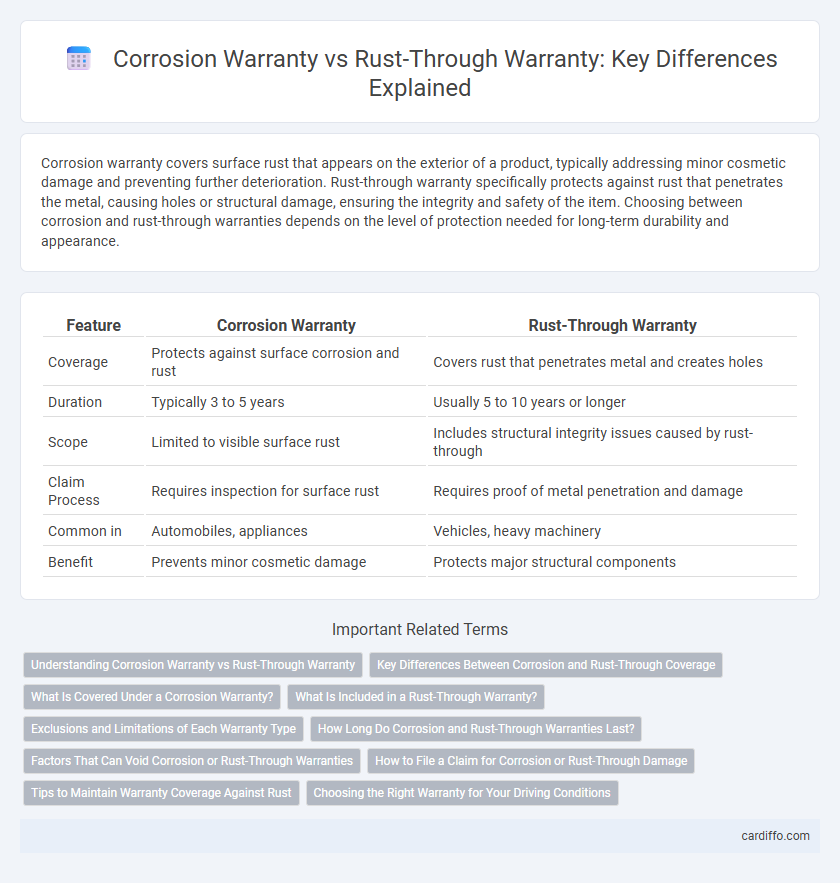Corrosion warranty covers surface rust that appears on the exterior of a product, typically addressing minor cosmetic damage and preventing further deterioration. Rust-through warranty specifically protects against rust that penetrates the metal, causing holes or structural damage, ensuring the integrity and safety of the item. Choosing between corrosion and rust-through warranties depends on the level of protection needed for long-term durability and appearance.
Table of Comparison
| Feature | Corrosion Warranty | Rust-Through Warranty |
|---|---|---|
| Coverage | Protects against surface corrosion and rust | Covers rust that penetrates metal and creates holes |
| Duration | Typically 3 to 5 years | Usually 5 to 10 years or longer |
| Scope | Limited to visible surface rust | Includes structural integrity issues caused by rust-through |
| Claim Process | Requires inspection for surface rust | Requires proof of metal penetration and damage |
| Common in | Automobiles, appliances | Vehicles, heavy machinery |
| Benefit | Prevents minor cosmetic damage | Protects major structural components |
Understanding Corrosion Warranty vs Rust-Through Warranty
Corrosion warranty covers surface rust and minor paint deterioration, preventing cosmetic damage to the vehicle's body panels, while rust-through warranty specifically addresses rust that penetrates the metal, causing holes or structural damage. Corrosion warranties typically have shorter durations and exclude rust-through issues, whereas rust-through warranties offer extended protection focused on integrity and safety concerns due to metal perforation. Understanding the distinction helps consumers evaluate coverage for both surface aesthetics and long-term durability against rust damage.
Key Differences Between Corrosion and Rust-Through Coverage
Corrosion warranty covers surface rust that appears on the vehicle's exterior, protecting against paint bubble formation and coating failure, while rust-through warranty specifically covers perforation or holes caused by rust penetrating completely through the metal. Corrosion coverage often includes cosmetic repairs to maintain appearance, whereas rust-through coverage addresses structural integrity by repairing or replacing affected panels. Understanding these distinctions helps vehicle owners select appropriate protection based on the severity and type of rust damage expected.
What Is Covered Under a Corrosion Warranty?
A corrosion warranty typically covers damage caused by surface rust that deteriorates the vehicle's paint or metal coating, preventing premature weakening or cosmetic defects. It includes repairs or replacement of affected panels due to corrosion-related issues but generally excludes rust-through, which involves holes created by rust penetrating the metal completely. The coverage ensures protection against superficial corrosion, maintaining the vehicle's aesthetic and structural integrity over the warranty period.
What Is Included in a Rust-Through Warranty?
A rust-through warranty covers the repair or replacement of vehicle panels that develop holes due to rust corrosion, ensuring protection against structural damage that compromises the vehicle's integrity. Unlike general corrosion warranties that may only address surface rust or cosmetic blemishes, a rust-through warranty specifically includes metal perforation from oxidation. This warranty typically covers key body panels such as the floor pans, rocker panels, quarter panels, and wheel wells, providing long-term assurance against advancing rust damage.
Exclusions and Limitations of Each Warranty Type
Corrosion Warranty typically covers surface rust and corrosion that affect the vehicle's outer panels but excludes damage from environmental factors like salt, chemicals, and improper maintenance. Rust-Through Warranty specifically guarantees repair for rust that perforates the metal, yet often excludes surface rust and damage caused by accidents, modifications, or neglect. Both warranties have limitations related to mileage, duration, and require proper maintenance to remain valid.
How Long Do Corrosion and Rust-Through Warranties Last?
Corrosion warranties typically cover surface rust and paint deterioration for 3 to 5 years, while rust-through warranties provide protection against holes forming in the metal due to corrosion, often lasting 7 to 12 years or more. The duration varies by manufacturer and vehicle type, with extended rust-through warranties commonly found in higher-end or heavily tested models. Consumers should review warranty terms carefully to understand coverage periods and specific conditions related to corrosion and rust damage.
Factors That Can Void Corrosion or Rust-Through Warranties
Corrosion and rust-through warranties often become void if the vehicle owner neglects regular maintenance such as washing and undercarriage cleaning to remove salt and debris that accelerate metal deterioration. Modifications involving non-approved coatings or repairs using incompatible materials can also invalidate these warranties, as manufacturers require adherence to specific repair protocols. Environmental factors like exposure to harsh chemicals or off-road conditions not specified in the warranty terms may further lead to voiding coverage for corrosion or rust-through damage.
How to File a Claim for Corrosion or Rust-Through Damage
To file a claim for corrosion or rust-through damage, start by thoroughly reviewing your vehicle's corrosion warranty terms to understand coverage specifics and claim deadlines. Gather essential documentation, including proof of vehicle maintenance, photos of the affected areas, and a detailed inspection report from a certified mechanic. Submit your claim through the manufacturer's designated warranty service center or online portal, ensuring all required forms and evidence are completed and included to expedite the approval process.
Tips to Maintain Warranty Coverage Against Rust
To maintain warranty coverage against rust, regularly wash and inspect your vehicle, paying close attention to areas prone to corrosion such as wheel wells and undercarriage. Promptly address any chips, scratches, or dents by applying touch-up paint or protective coatings to prevent moisture intrusion. Keep detailed records of maintenance and repairs to support warranty claims related to corrosion or rust-through issues.
Choosing the Right Warranty for Your Driving Conditions
Corrosion warranty typically covers surface rust or corrosion that affects the vehicle's appearance, while rust-through warranty protects against rust that penetrates the metal and causes structural damage. Selecting the appropriate warranty depends on your driving environment, with corrosion warranty sufficing in dry climates and rust-through warranty being essential in regions with heavy salt use or high humidity. Assessing local weather patterns and road treatment practices ensures optimal coverage and vehicle longevity.
Corrosion Warranty vs Rust-Through Warranty Infographic

 cardiffo.com
cardiffo.com